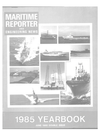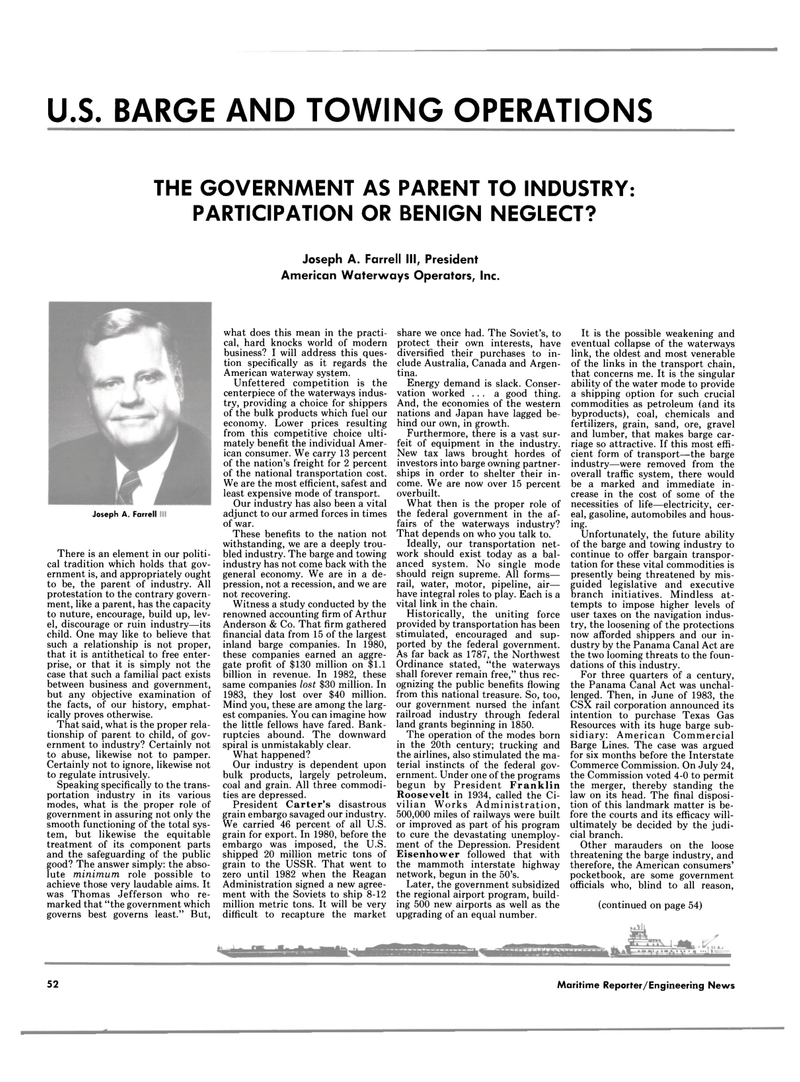
Page 54: of Maritime Reporter Magazine (June 1985)
Read this page in Pdf, Flash or Html5 edition of June 1985 Maritime Reporter Magazine
U.S. BARGE AND TOWING OPERATIONS
THE GOVERNMENT AS PARENT TO INDUSTRY:
PARTICIPATION OR BENIGN NEGLECT?
Joseph A. Farrell III, President
American Waterways Operators, Inc.
Joseph A. Farrell
There is an element in our politi- cal tradition which holds that gov- ernment is, and appropriately ought to be, the parent of industry. All protestation to the contrary govern- ment, like a parent, has the capacity to nuture, encourage, build up, lev- el, discourage or ruin industry—its child. One may like to believe that such a relationship is not proper, that it is antithetical to free enter- prise, or that it is simply not the case that such a familial pact exists between business and government, but any objective examination of the facts, of our history, emphat- ically proves otherwise.
That said, what is the proper rela- tionship of parent to child, of gov- ernment to industry? Certainly not to abuse, likewise not to pamper.
Certainly not to ignore, likewise not to regulate intrusively.
Speaking specifically to the trans- portation industry in its various modes, what is the proper role of government in assuring not only the smooth functioning of the total sys- tem, but likewise the equitable treatment of its component parts and the safeguarding of the public good? The answer simply: the abso- lute minimum role possible to achieve those very laudable aims. It was Thomas Jefferson who re- marked that "the government which governs best governs least." But, what does this mean in the practi- cal, hard knocks world of modern business? I will address this ques- tion specifically as it regards the
American waterway system.
Unfettered competition is the centerpiece of the waterways indus- try, providing a choice for shippers of the bulk products which fuel our economy. Lower prices resulting from this competitive choice ulti- mately benefit the individual Amer- ican consumer. We carry 13 percent of the nation's freight for 2 percent of the national transportation cost.
We are the most efficient, safest and least expensive mode of transport.
Our industry has also been a vital adjunct to our armed forces in times of war.
These benefits to the nation not withstanding, we are a deeply trou- bled industry. The barge and towing industry has not come back with the general economy. We are in a de- pression, not a recession, and we are not recovering.
Witness a study conducted by the renowned accounting firm of Arthur
Anderson & Co. That firm gathered financial data from 15 of the largest inland barge companies. In 1980, these companies earned an aggre- gate profit of $130 million on $1.1 billion in revenue. In 1982, these same companies lost $30 million. In 1983, they lost over $40 million.
Mind you, these are among the larg- est companies. You can imagine how the little fellows have fared. Bank- ruptcies abound. The downward spiral is unmistakably clear.
What happened?
Our industry is dependent upon bulk products, largely petroleum, coal and grain. All three commodi- ties are depressed.
President Carter's disastrous grain embargo savaged our industry.
We carried 46 percent of all U.S. grain for export. In 1980, before the embargo was imposed, the U.S. shipped 20 million metric tons of grain to the USSR. That went to zero until 1982 when the Reagan
Administration signed a new agree- ment with the Soviets to ship 8-12 million metric tons. It will be very difficult to recapture the market share we once had. The Soviet's, to protect their own interests, have diversified their purchases to in- clude Australia, Canada and Argen- tina.
Energy demand is slack. Conser- vation worked ... a good thing.
And, the economies of the western nations and Japan have lagged be- hind our own, in growth.
Furthermore, there is a vast sur- feit of equipment in the industry.
New tax laws brought hordes of investors into barge owning partner- ships in order to shelter their in- come. We are now over 15 percent overbuilt.
What then is the proper role of the federal government in the af- fairs of the waterways industry?
That depends on who you talk to.
Ideally, our transportation net- work should exist today as a bal- anced system. No single mode should reign supreme. All forms— rail, water, motor, pipeline, air— have integral roles to play. Each is a vital link in the chain.
Historically, the uniting force provided by transportation has been stimulated, encouraged and sup- ported by the federal government.
As far back as 1787, the Northwest
Ordinance stated, "the waterways shall forever remain free," thus rec- ognizing the public benefits flowing from this national treasure. So, too, our government nursed the infant railroad industry through federal land grants beginning in 1850.
The operation of the modes born in the 20th century; trucking and the airlines, also stimulated the ma- terial instincts of the federal gov- ernment. Under one of the programs begun by President Franklin
Roosevelt in 1934, called the Ci- vilian Works Administration, 500,000 miles of railways were built or improved as part of his program to cure the devastating unemploy- ment of the Depression. President
Eisenhower followed that with the mammoth interstate highway network, begun in the 50's.
Later, the government subsidized the regional airport program, build- ing 500 new airports as well as the upgrading of an equal number.
It is the possible weakening and eventual collapse of the waterways link, the oldest and most venerable of the links in the transport chain, that concerns me. It is the singular ability of the water mode to provide a shipping option for such crucial commodities as petroleum (and its byproducts), coal, chemicals and fertilizers, grain, sand, ore, gravel and lumber, that makes barge car- riage so attractive. If this most effi- cient form of transport—the barge industry—were removed from the overall traffic system, there would be a marked and immediate in- crease in the cost of some of the necessities of life—electricity, cer- eal, gasoline, automobiles and hous- ing.
Unfortunately, the future ability of the barge and towing industry to continue to offer bargain transpor- tation for these vital commodities is presently being threatened by mis- guided legislative and executive branch initiatives. Mindless at- tempts to impose higher levels of user taxes on the navigation indus- try, the loosening of the protections now afforded shippers and our in- dustry by the Panama Canal Act are the two looming threats to the foun- dations of this industry.
For three quarters of a century, the Panama Canal Act was unchal- lenged. Then, in June of 1983, the
CSX rail corporation announced its intention to purchase Texas Gas
Resources with its huge barge sub- sidiary: American Commercial
Barge Lines. The case was argued for six months before the Interstate
Commerce Commission. On July 24, the Commission voted 4-0 to permit the merger, thereby standing the law on its head. The final disposi- tion of this landmark matter is be- fore the courts and its efficacy will- ultimately be decided by the judi- cial branch.
Other marauders on the loose threatening the barge industry, and therefore, the American consumers' pocketbook, are some government officials who, blind to all reason, (continued on page 54) 52 Maritime Reporter/Engineering News

 53
53

 55
55
